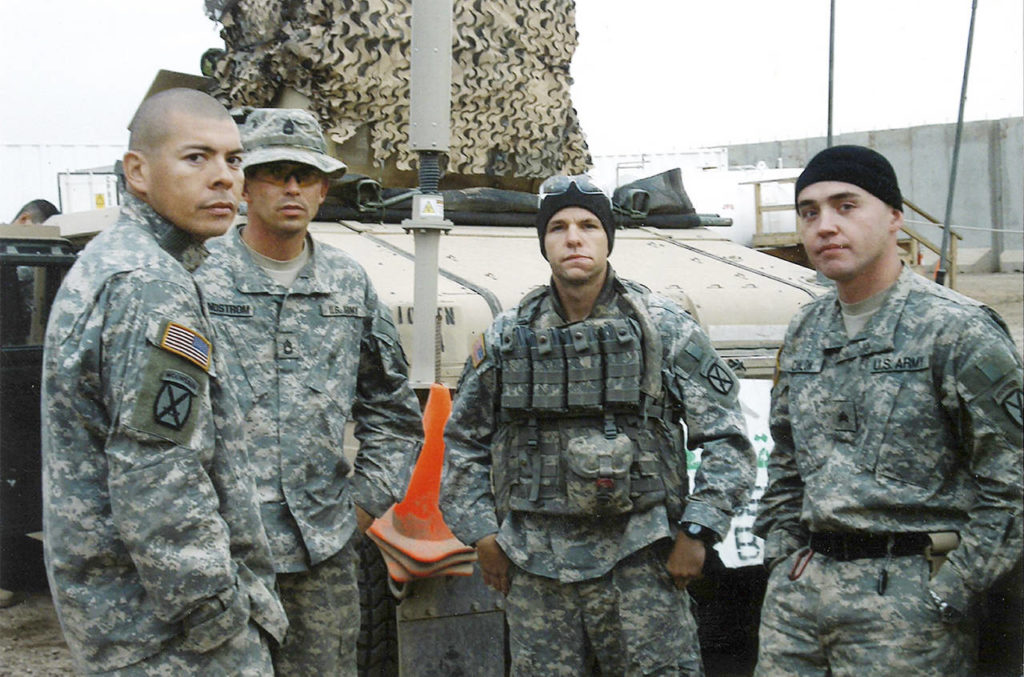By Dan Lamothe / The Washington Post
Army Sgt. Sand Aijo was in the gun turret of a Humvee in 2007 when he and his fellow soldiers rolled up on two suspicious men in Iraq’s “Triangle of Death.” They were in a place U.S. soldiers didn’t expect to find them, and so glassy-eyed and fidgety that Aijo charged his machine gun, he recalled.
Staff Sgt. Travis Atkins, their gruff but revered squad leader, stepped out of the Humvee and walked toward the first stranger. Then an Army medic stepped out of the back seat, moving toward the second.
As Aijo tried to keep track of both soldiers, Atkins unexpectedly began grappling with the first Iraqi just a few feet away. Atkins slammed the man to the ground and threw himself on top of him.
“The thing that became confusing was that once they hit the ground, the way that Travis began positioning his body, it just seemed strange to me,” Aijo recalled. “That’s when the detonation happened.”
On Wednesday, Atkins, of Bozeman, Montana, posthumously will become the fifth U.S. service member to receive the nation’s highest award for combat valor, the Medal of Honor, for actions during the eight-year Iraq War. A member of the 10th Mountain Division of Fort Drum, New York, he is credited with saving the lives of Aijo and two other soldiers by smothering a suicide vest laced with grenades, worn by the man he body-slammed.
Atkins, 31, was nominated for the Medal of Honor by his battalion commander, now-retired Col. John Valledor. But the Army downgraded the award one level to a Distinguished Service Cross, presented to Atkins’s family in 2008.
The awarding of the still-prestigious Service Cross was part of a broader trend that frustrated many rank-and-file service members. With so much combat in Iraq and Afghanistan, they wondered, why had so few Medals of Honor been awarded?
The concerns caught the attention of Chuck Hagel, a defense secretary in the Obama administration who ordered a review of how the award was processed.
In 2016, his successor, Ashton Carter, directed the military to scrutinize more than 1,100 top valor cases in which the Medal of Honor was not awarded, including Atkins’s and that of Air Force Tech Sgt. John Chapman, who received the nation’s highest military decoration posthumously last August.
No living service member has received the Medal of Honor for actions in the Iraq War. Seventeen Americans have been awarded Medals of Honor for actions in Afghanistan, including four posthumous awards. It isn’t clear whether other upgrades are planned.
Members of the Atkins family told reporters Tuesday afternoon at the Pentagon that they were appreciative of the Distinguished Service Cross and did not believe that the level of their loved one’s recognition would be elevated when the White House reached out to them.
In fact, Atkins’s son, Trevor Oliver, and father, Jack, both said with a chuckle that they initially thought the calls from Washington were part of a scam. In reality, it was administration staff members trying to connect them with President Trump.
“I thought there was some elaborate plan going on and they were just trying to fool me. I immediately was not very nice to people on the phone, and I was being rather rude,” said Oliver, who was 11 when his father died and will accept the award on his behalf. “My girlfriend was in the room, and she said my jaw was on the floor and I was beet red. It was a liberating experience. It’s such an incredible, incredible honor.”
Valledor said he was “pretty satisfied” with Atkins receiving the Distinguished Service Cross. But he acknowledged being surprised when the higher award was not approved.
“I had a lengthy discussion with my chain of command, and I think the consensus was that we were too close to it,” he said, “that we were too emotionally tied to the narrative.”
Valledor said he researched cases of valor from earlier wars and was struck by the similarities between Atkins’s actions and those of other Medal of Honor recipients who smothered grenades to save their comrades’ lives.
“The only difference here,” Valledor said, “was that it was a living grenade.”
Aijo said he was “speechless” when he found out about the upgrade for his former mentor.
“You don’t think about things like this that often, so it brought back a lot of emotion for me,” he said. “Once I had time to kind of settle and bring back my thoughts, I was extremely overjoyed. It was nice to know that a grateful nation would be equally thankful for this sacrifice as I was.”
Talk to us
> Give us your news tips.
> Send us a letter to the editor.
> More Herald contact information.


























